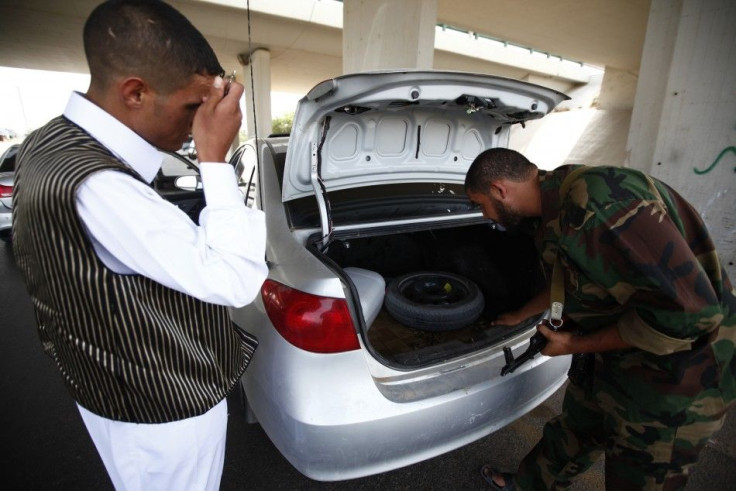Libya: Black Africans Living in Dire Straits

Black African workers trapped in Libya are living under dire circumstances as rebel forces have taken over most of the country and target sub-Saharan African migrants for their alleged loyalties to Moammar Gaddafi.
Tales of intimidation, racial violence and even murder are multiplying for the hundreds of thousands of black Africans who came to Libya to find work.
A Nigerian worker in a camp for displaced Africans near Tripoli told Reuters: A group of men broke through my door and asked for the money. I handed it over, and in a few seconds I lost everything I had worked for seven years. My brother didn't give them his money. They told me to move out of the way, and they made him lie down. Then they shot him in the head.”
He added: The Libyans betrayed my trust for them ... I don't want to see Libya again. Everything I worked for is gone.”
Another Nigerian told Reuters of a harrowing experience he had went stopped on the street by Libyan rebels.
They found a military sweater in the trunk of car. They took us out of the car and started shouting violently that they were going to kill us. They searched us and took our mobile phones. I prayed to God to help me, he said.
Since the civil war erupted six months ago, thousands of foreign migrants (from all over the world) have fled Libya, but many were unable to escape. Black Africans are especially vulnerable to violence due to the widely held perception that Gaddafi hired blacks as his mercenaries and because of the former leader’s tremendous financial support of African countries.
Another factor, of course, is anti-black racism – which is now manifesting in its most visceral form.
Despite Moammar Gadhafi’s long financial support for Black African nations (and his impossible dream of achieving a “United States of Africa” that would include Libya), anti-black racism is deeply entrenched in many Arab societies, including Libya.
And that racism has taken a lethal turn in recent months -- uncounted hundreds, maybe thousands, of black Africans from countries like Nigeria, Senegal, Ghana, Sudan, and elsewhere have been arbitrarily beaten and murdered by Libyans (reportedly both by rebels and by those representing the waning regime of Gadhafi).
Complicating matters is that since Gadhafi has long employed the services of black African as soldiers and mercenaries, many ordinary black migrant workers have suffered horrific abuse and even death due to that perceived association.
It may also be fair to conclude that Libyan Arabs have taken advantage of the ongoing civil war to exact murderous revenge against the hundreds of thousands of black Africans who have entered Libya in the past decade to look for work – a violent explosion of xenophobia and racism that have lurked just under the surface.
Libyans (who are principally Arabs) generally do not consider themselves to be ‘Africans’ although the country is located on the African content. The term ‘African’ in Libya is reserved for the country’s minority of immigrants (many of whom are illegal) from sub-Saharan Africa.
According to a report in The Guardian, some Libyan rebels seem to regard the war against Gadhafi as tantamount to a battle against black people. In the town of Misurata, where brutal fighting has taken place, a rebel painted a slogan of a wall which praised the brigade for purging slaves, black skin.”
A correspondent for Amnesty International told western media that the National Transitional Council (NTC), Libya's interim government, “[has] made matters worse. They have ignited public anger by tapping into an existing xenophobia with very dire consequences for many guest workers.”
Before the revolt started, there were an estimated 2.5-million migrant workers in Libya, perhaps the majority from black Africa. Many remain trapped in the country with no way to get home.
“I think that there are levels of racism within Libyan society that are quite problematic. But racism is not just against other Africans, meaning non-Libyan Africans, but also within Libya itself, said Na'eem Jeenah, executive director of the Afro-Middle East Centre in Johannesburg, South Africa, according to reports.
Gadhafi’s bodyguards, many of those people are actually from the south of Libya, partly because Gadhafi trusts them more than he would trust people from the north for various tribal and other reasons.
A Ghanaian migrant worker named Hussein Zachariah, who worked in Benghazi, told reporters of his experiences in Libya: “They [Libyans] say a lot of things about you. They call you a slave.”
Resentment against black migrants in Libya spiked in 2000 after the government instituted a crackdown on illegals in the country. This emboldened young Libyans to attack and kill dozens, perhaps hundreds, of migrants from Ghana, Cameroon, Sudan, Niger, Burkina Faso, Chad and Nigeria.
Libyan government officials fanned the flames of hatred by blaming the African migrants for rising crime and drug trafficking.
There were also similar spates of anti-African violence in 2006 and 2009.
During the recent disturbances in Libya, one correspondent for the Irish Independent newspaper wrote: “We also heard many Ethiopians killed by angry mob in Benghazi. Moammar Gadhafi- haters are taking revenge on black Africans for money Gadhafi threw for many African dictators. The mob attacked and killed many Africans including Ethiopians for being only black… I am afraid this uprising will take the lives of many black Africans including many Ethiopians.”
Perhaps it is understandable why the vast majority of African Union nations have withheld their support of the NTC -- including Zimbabwe, which has just expelled the Libyan ambassador for favoring the rebels. There were also rumors floating recently that Gadhafi may have sought refuge in Zimbabwe under the protection of President Robert Mugabe.
It will now be interesting to see how the new post-Gadhafi government in Libya deals with black Africa.
© Copyright IBTimes 2025. All rights reserved.





















